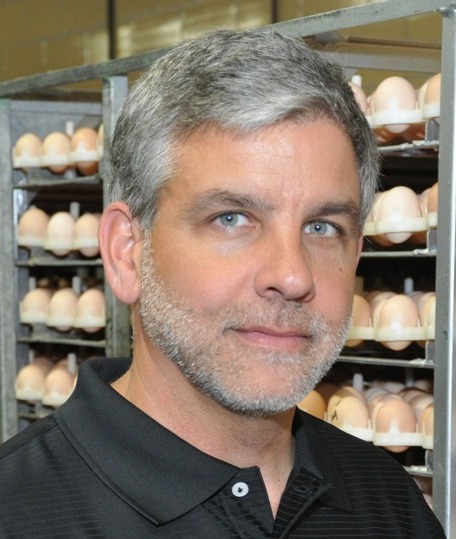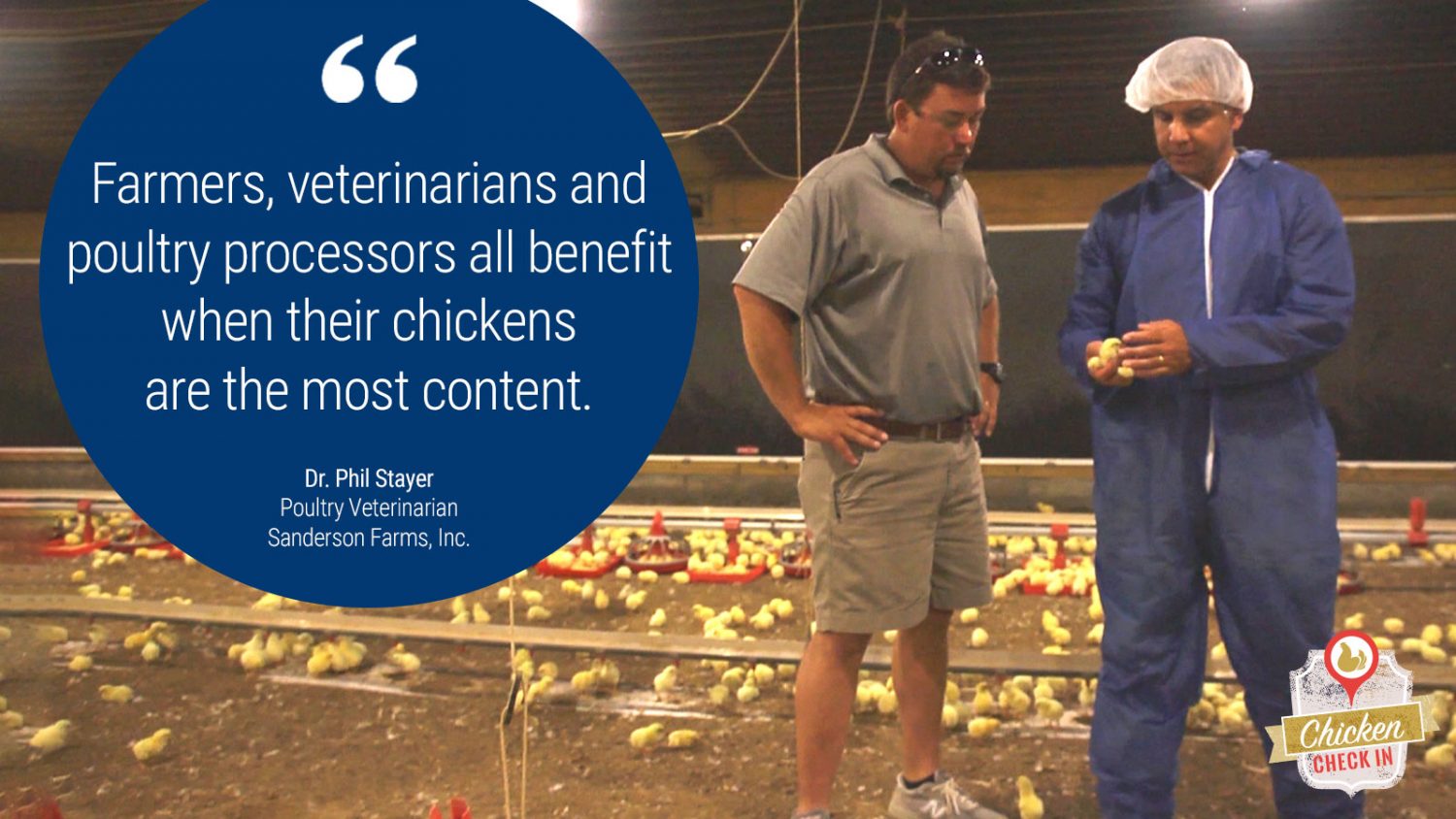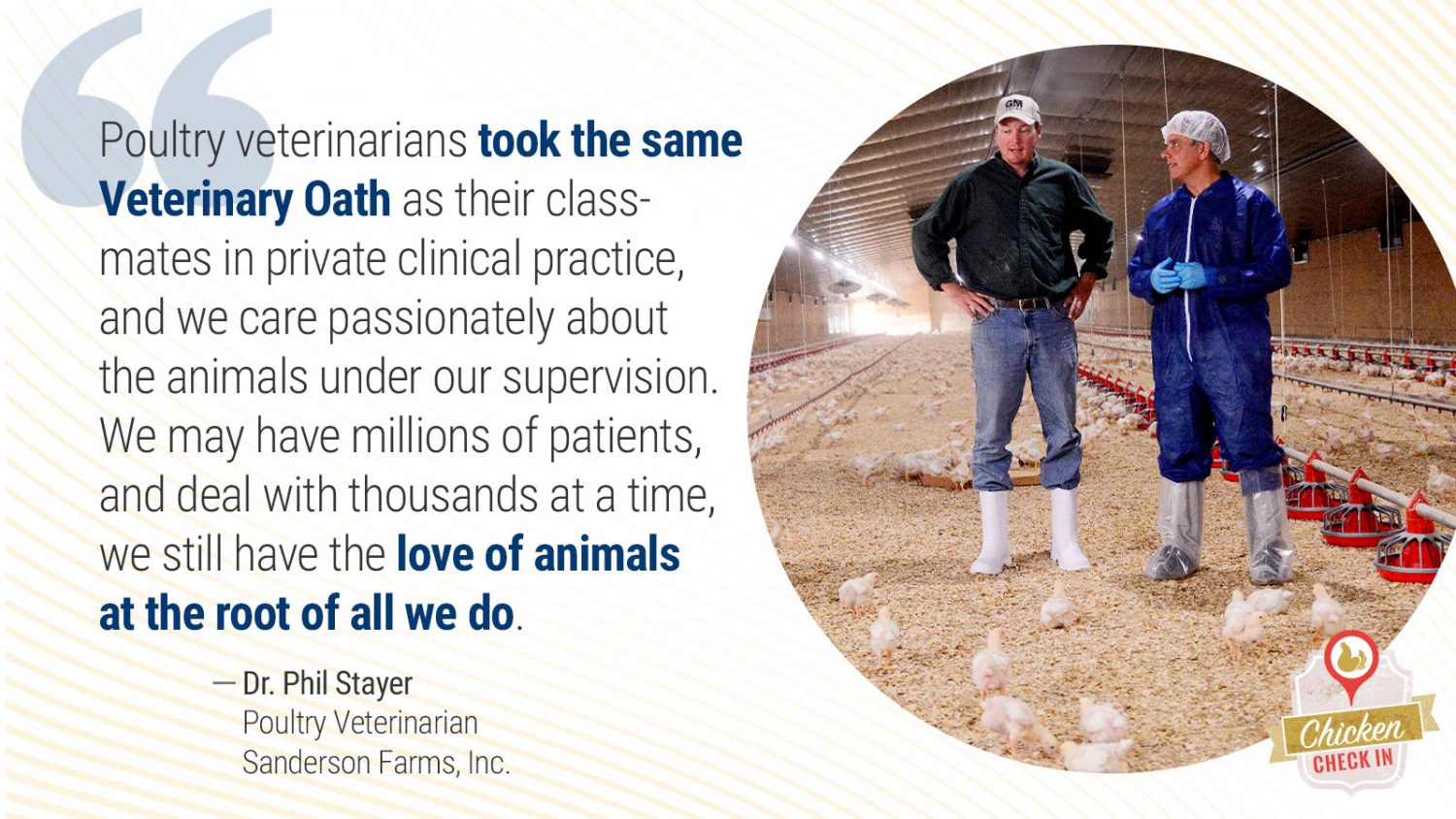When most people think of a broiler chicken farm, the chickens and farmers who care for them often come to mind first. But poultry veterinarians also play a vital role and are important partners to farmers. In fact, licensed veterinarians provide comprehensive health care programs for every commercial broiler chicken flock. This week on Chicken Check In, Dr. Phil Stayer gave us an inside look into the important role veterinarians play on poultry farms, shares his passion for animals and explains how vets work to educate farmers on how to maintain the health of their birds.
Dr. Stayer has been a veterinarian at Sanderson Farms, Inc. for over a decade and has been specialty certified as a diplomate by the American College of Poultry Veterinarians since 1994.
The following blog post originally appeared this week on Chicken Check In. You can view it by clicking here.
We’re excited to learn more about your background. What got you interested in pursuing a career as a veterinarian?

Dr. Phil Stayer
Dr. Stayer: I assumed that everybody was born wanting to be a veterinarian, and those of us that didn’t grow up, continued on to become one. Seriously, a love of God’s creatures is what started my journey into veterinary medicine. I was raised in a suburban home with a few pets. Most of my animal exposure was vicarious through reading James Herriot’s books and then later through volunteering with private veterinary practitioners.
I pursued veterinary medicine knowing it was a difficult journey, both intellectually and financially demanding. I eventually spent nine years after high school graduation to obtain three degrees, lots of debt and an opportunity to work as a veterinarian with commercial chickens.
What role do veterinarians play on chicken farms?
Dr. Stayer: Commercial poultry veterinarians are really veterinary epidemiologists. We work to prevent disease from recurring or preferably from ever getting on the farm.
The first step to disease prevention is biosecurity. Poultry veterinarians design biosecurity programs from what we’re taught and adapt as we learn new lessons. Every time there is a reportable disease, that is, one that the state veterinarian gets involved, we do in depth on farm investigations to see what didn’t work. Most of the time implementation of the existing program is the problem, but occasionally new biosecurity interventions are added due to a previously unforeseen risk.
How do vets diagnose and prevent disease?
Dr. Stayer: Disease diagnosis is probably the favorite role of most poultry veterinarians, not that animals got sick, but that we get to use all those years of training and experience to alleviate animal suffering. Rarely do we find the final diagnosis by ourselves as we utilize regional diagnostic laboratories to conduct virus isolation, bacterial growth and susceptibilities, molecular identification and other advanced technologies perhaps even more so than family doctors. Once we have a diagnosis, we typically attempt to alleviate animal suffering with the very few tools we still have left to use: many efficacious antibiotics have been taken away from poultry veterinarians. We learn what happened to the current flock and make adjustments to keep the next flock from getting sick with the same disease.
Aside from disease prevention, what else do veterinarians monitor?
Dr. Stayer: Poultry veterinarians work with an entire team of production managers, from hatchery through feed mill and farm service personnel, as well as nutritionists, to provide the optimal habitat for chickens under our care. Veterinarians typically oversee the animal welfare programs which all center around meeting the needs of the animals. Growing programs are designed to provide the best temperature, light intensity, flock density, nutrient profile and so on for each stage of the chicken’s life, from hatch until catch, so that chicken comfort usually provides the bases for healthy flocks. If the animals are comfortable, they are less likely to succumb to disease agents that may be inadvertently introduced to the flock. Farmers, veterinarians and poultry processors all benefit when their chickens are the most content.

How are you helping educate farmers to take the best care of their flocks?
Dr. Stayer: When poultry vets are called to farms, they use the opportunity to educate growers about the particular problem found and how to prevent the same problem from recurring. Most of the time integrators’ veterinarians train Service Technicians who in turn train their respective farmers about particular veterinary issues of immediate importance.
Do chicken farmers have to go through a formal training process by veterinarians to ensure the health of their flocks? What does that process look like?
Dr. Stayer: Chicken farmers are provided Growing Programs upon the signing their Contractual Agreement to Grow Chickens for a particular integrator. All contract chicken farmers are expected to read the documents and also provided with company trained Service Technicians to work out the actual details of the Growing Program. Growing Programs are based upon years of animal care-taking experience and guarantee the birds’ needs are being met. Chicken growers learn with each flock how better to adapt their particular farm housing and equipment to meet the needs of their flocks. In time, experienced Contract Chicken Growers educate visiting veterinarians on how to best manage flocks on their particular farms!
What role do technicians play on farms and how do they coordinate with farmers and veterinarians?
Dr. Stayer: Commercial chicken doctors work with a staff of company Service Technicians that become, in essence, poultry veterinary technicians. We teach Service Personnel about twice a year on disease recognition, or more exactly, what isn’t right or what is outside the range of normal for each stage of chicken development. With cell phones, Service Technicians can inform company veterinarians quickly and precisely for timely interventions with sick flocks. Hopefully flocks are on the mend by the time the company veterinarian makes their in person trip to the farm.
How has technology positively impacted how you interact with farmers and their flocks?
Dr. Stayer: Perhaps the most impactful technological change within poultry husbandry has been the in-house environmental controller/computer. Regardless of the manufacturer, having sensors monitor environmental conditions linked to controllers to turn on and off equipment, around the clock, every day of the week, allows chicken houses to better meet the comfort needs of the inhabitants. When everything is working right, modern chicken houses provide optimal environments day and night. The downfall of the computer controlled house is when it is left by itself to accommodate for all the animals’ needs. Animal husbandry still requires human oversight to “husband” the animals.
Cellular phones, jokingly referred to as “my leash,” allow almost instant contact with any member of the integrator’s team, granted, of course, the signal is good enough on the particular hill or holler one may be located. Service Technicians can send high quality images and videos of problems with the birds they’re currently seeing while I’m typically elsewhere in the country. Live Veterinarians within the company can share images with each other to gain insights from others. With the correct software, cell phones and computers allow veterinarians in the field, that is, away from their desks, to prescribe medications in a timely basis. Emails help to rapidly disseminate field reports, laboratory reports, disease alerts, vaccine program updates, and just about every other program change veterinarians oversee.

What is your favorite aspect of being a veterinarian in the chicken industry?
Dr. Stayer: I appreciate the “small world” feel of poultry veterinarians inside the very large industry of poultry production. We all have benefited from mentors within the poultry veterinary community and every active poultry veterinarian I know takes time to work with the next generation of up and coming poultry veterinarians. For me in particular, Dick “Doc” Boyd, modeled for me what it meant to be a poultry veterinarian while I was still a veterinary student at the University of Tennessee. Doc mentored many students now currently mature poultry veterinarians training others. I continue to mimic his mentoring technique by including students into my everyday life, both on the job and with my family.
Poultry veterinarians also learn from one another through shared experiences. There are no competitive advantages to keeping diseases secret as your healthy flocks benefit your neighbors’ flocks’ health. Like the U.S. Marines, we are few but proud.
What is the one thing you would most want our readers to know about the veterinary care chickens receive?
Dr. Stayer: Poultry veterinarians took the same Veterinary Oath as their classmates in private clinical practice, and we care passionately about the animals under our supervision. We may have millions of patients, and deal with thousands at a time, we still have the love of animals at the root of all we do, otherwise we would be doing something else. Poultry veterinarians, like their clinical counterparts, do the best for their patients (the chickens) as their patients’ owners (integrators) and available technology allow.
“Being admitted to the profession of veterinary medicine, I solemnly swear to use my scientific knowledge and skills for the benefit of society through the protection of animal health, the relief of animal suffering, the conservation of animal resources, the promotion of public health, and the advancement of medical knowledge. I will practice my profession conscientiously, with dignity, and in keeping with the principles of veterinary medical ethics. I accept as a lifelong obligation the continual improvement of my professional knowledge and competence.”
Today’s broiler chickens thrive in commercial settings due to the technologically advanced environments, nutrition and veterinary care they receive.
Curious to learn more about poultry veterinarians? Check out our FAQ on veterinary care.

